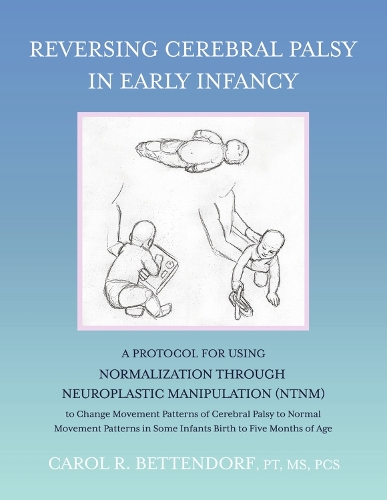
Reversing Cerebral Palsy in Early Infancy: A Protocol for Using Normalization Through Neuroplastic Manipulation (NTNM)
(Paperback)
Publishing Details
Reversing Cerebral Palsy in Early Infancy: A Protocol for Using Normalization Through Neuroplastic Manipulation (NTNM)
By (Author) Carol R. Bettendorf PT MS PCS
BookBaby
BookBaby
3rd January 2023
United States
Classifications
General
Non Fiction
618.92836
Physical Properties
Paperback
102
Width 215mm, Height 279mm, Spine 7mm
308g
Description
The author's purpose in writing this book is to give physicians, ,physical therapists, parents, and caregivers of young infants who are showing characteristics of Cerebral Palsy a protocol that can prevent Cerebral Palsy, in many cases, as the infant gets older. This protocol has been used effectively for over twenty years in the author's Pediatric Physical Therapy practice. The protocol is called Normalization Through Neuroplastic Manipulation (NTNM). When this protocol is used, some infants can grow up with normal movement patterns that no longer require therapy instead of with Cerebral Palsy.
Many resources state that cerebral palsy is hard wired into the infant's brain at birth and that the condition cannot be changed to normal movement. It is commonly thought today that we can help the infant with Cerebral Palsy improve his movement patterns through therapy but we cannot change the movement patterns of Cerebral Palsy to normal movement patterns. This child will always have gross motor issues of cerebral palsy.
Research has shown that the assumption that Cerebral Palsy is a disorder that is permanently part of the infant's development is not true in some cases. Sources of research that uphold the idea that abnormal movement patterns can be reversed to normal movement patterns in early infancy because of the plasticity of the infant's nervous system when responding to environmental input are included in this book..
NTNM is a simple protocol in practice. The author has been using it for over twenty tears with excellent results. Case studies will be presented from her Pediatric Physical Therapy practice. The protocol has no negative aspects when used as directed. The author urges you to try it with infants who are using excessive extension patterns. Characteristics of infants at risk for Cerebral Palsy are presented. The General Movement Assessment (GMA), an evaluation which can be given and is 95% valid and reliable in diagnosing Cerebral Palsy in early infancy is discussed.
Parent carryover of handling methods presented in therapy is essential for NTNM to work. Parents are treated with respect, as partners, on the team that will help the infant. Positive aspects of the infant's behavior are emphasized during treatment sessions as well as in the treatment plan for the next week. Parent work at home is done during positive interactions in play and with positioning and handling while the infant is playing and awake and sometimes while the infant is sleeping.
The infant, parent, and physical therapist experience NTNM as a positive, productive and enjoyable experience.
Author Bio
Carol R. Bettendorf, PT, MS, PCS has practiced Pediatric Physical Therapy for over 30 years. The following course work contributed to her experience in writing the Normalization Through Neuroplastic Manipulation (NTNM) protocol and includes: Certification in the NeuroDevelopmental Treatment (NDT) eight week pediatric course and Certification in the NDT three week baby course. She has completed eight months of Moshe Feldenkrais Method training to become a Feldenkrais Practitioner as an addition to her Physical Therapy work.. Ms Bettendorf taught Pediatric Physical Therapy at what is now Roselyn Franklin University for eight years. At present, she is a partner in The Therapy Tree, LLC clinic which offers Physical, Occupational, and Speech Pediatric Therapies and Counseling Therapies which include pediatric, adult, and family counseling.
